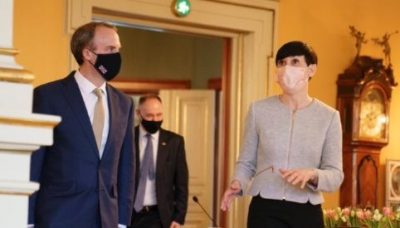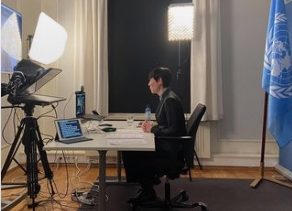Norway’s strict Corona virus containment rules have kept Foreign Minister Ine Eriksen Søreide from traveling, and arguably doing an important part of her job, but now she’s won a special exemption. Søreide will be able to attend NATO’s ministerial meeting in Brussels next week after all, and meet her new American counterpart, US Secretary of State Antony Blinken.

There’s been some debate over how Norway’s closed borders and strict quarantine regulations interfere with important physical meetings for top government officials. Newspaper Dagens Næringsliv (DN) reported Wednesday on how they’ve made critical post-Brexit trade negotiations more challenging and worried experts on international relations, since not even government ministers have been able to travel abroad to represent or defend Norway’s interests.
“Most other countries have let their government ministers be vaccinated (ahead of others in their age groups) and allowed them to travel,” Iver B Neumann, a foreign relations scholar and director of Fridtjof Nansens Institute, told DN. “From a foreign policy point of view, this is damaging, because we need to show the flag on a regular basis, especially when other countries are doing it.”

Søreide could welcome British Foreign Minister Dominic Raab to Oslo last week but hadn’t planned to travel to Brussels herself for the important meeting of all NATO members’ foreign ministers. “The foreign minister is following the applicable infection prevention rules in Norway, and therefore we’re not planning for her physical participation at the NATO meeting,” the ministry’s communicatinos chief Trude Måseide told DN earlier this week. “We’re in dialog with NATO regarding practical solutions.”
Måseide also noted that Søreide was due to take part in Parliamentary debate in Oslo the day after the NATO meeting, which runs from March 23-24, but that wouldn’t be possible if she had to go into quarantine upon her return from Brussels.
Søreide herself also defended her absence at various meetings, claiming that most are held digitally anyway. She said she felt she has still represented Norway’s interests well during the pandemic. “Travel isn’t forbidden,” she added, “but we want to follow all the infection protection rules that are in force.”
That attitude reflects Norwegian sensitivity towards any hint of special treatment for high-ranking officials. A spokesman for the prime minister told DN that “we have a general travel advisory that applies to all Norwegians … and the government has also chosen to respect that.” Apart from a trip to Germany last August and Estonia in September, when current border and quarantine rules weren’t in effect, Norway’s foreign minister hasn’t set foot on foreign soil.
On Wednesday morning, however, the ministry announced she’d be traveling to Brussels after all. “The Parliament has shown great flexibility and moved the debates scheduled for March 25,” stated the ministry in a press release. “That makes it possible for the foreign minister to travel to Brussels and then go into quarantine on arrival back home, in line with the infection rules.”
That means Søreide will now be able to meet NATO officials and her fellow NATO foreign ministers at the meeting that will discuss Afghanistan, Russia and work on the NATO 2030 project. Otherwise she would have been among the very few to miss meeting the new US Secretary of State Antony Blinken, envoy for Norway’s single most important defense ally.
Søreide won’t have to defend any lack of defense spending either. As newspaper VG reported on Tuesday, Norway has now joined the so-called “2-percent club,” made up of NATO member countries that have finally met goals set back in 2014 that they should all spend at least 2 percent of gross national product on defense. Norway was long deemed unlikely to do so, but NATO’s annual report confirms that Norway has now boosted its defense spending from just 1.55 percent when the 2 percent goal was agreed upon.
The new NATO report also showed that 67 percent of Norwegians support NATO membership while 19 percent would have voted against it if a referendum were to be held today. Fully 74 percent think the risk of any attack is lower as a NATO member, while 10 percent think NATO membership makes Norway more of a target.
NewsInEnglish.no/Nina Berglund

